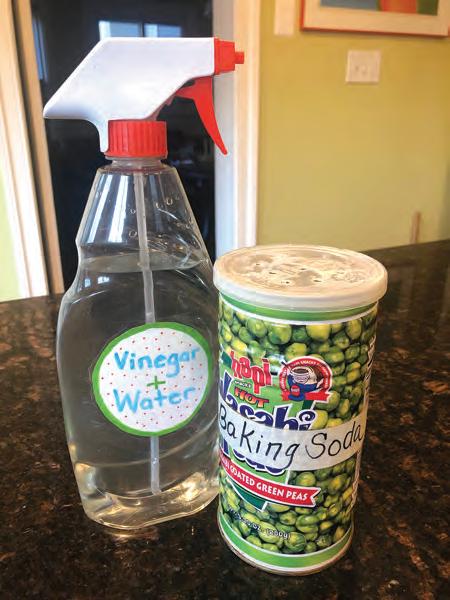
6 minute read
Cleaning – Naturally
It’s an interesting paradox that while many people are moving towards organic foods, household cleaners—which are often filled with toxins— are kept at the ready in many homes. With everyone, including kids and pets, spending more time at home these days than anyone ever imagined, reducing the number of toxic chemicals in your home makes a lot of sense. But, in these days when hygiene and cleanliness are of paramount concern, which natural cleaners really work?
wood furniture a beautiful glow. Put equal parts vinegar and water in a spray bottle, and you’re ready to tackle almost any cleaning project in your home from cleaning windows and mirrors to countertops. Though white vinegar doesn’t have a lingering smell, you can add some citrus peels to some vinegar, set it aside for a couple of weeks, and then add a bit of it to your vinegar and water solution for a clean, citrusy smell. And the addition of those fruit acids to the vinegar will increase the solution’s ability to clear stubborn stains.
When you need a bit of grit for your cleaning, baking soda is an excellent light abrasive. I buy it in bulk, so I have it on hand for any project. (You can purchase it online at Ace Hardware and have it delivered to Frager’s for pick up.) Baking soda will bring shine and cleanliness to any number of things – from your kitchen and bathroom sinks, the bottom of your grimy pots and pans and even your grandma’s silver or that old brass doorknob. I use it, or cream of tartar, to get rid of the scratches on my older dishes by Catherine Plume
White vinegar, water, and baking soda, and you’re ready to clean. Credit: C. Plume
White vinegar is a cleaning staple in our home. Straight white vinegar in a spray bottle will make your stainless steel appliances shine, while a douse in your laundry will work as a fabric softener substitute. I put a half cup of vinegar in my dishwasher and run it on the “quick wash” cycle every few weeks to keep food particles from building up inside the machine. A half cup of vinegar mixed with a cup of water, two tablespoons of oil (grapeseed, olive, coconut, etc.), and a drop or two of your favorite essential oil will give your

from time to time. (It works!) And, it will even work as a stovetop and oven cleaner. Apply a paste in your oven, leave it for a few hours and return for a quick clean up. When baking soda is mixed with vinegar, it becomes two new chemicals - carbonic acid and sodium acetate – a fizzy concoction that kids will love to watch. A one to two ratio mix of these two ingredients will create a mixture ideal for cleaning toilets and keeping drains flowing.
Thyme oil – and more specifically “thymol” found in thyme and bee balms among other plants—is proving to be another excellent natural cleaning/disinfecting product that can be used as a cleaning product throughout your home, though research indicates that it is ineffective against COVID-19. It, like neem oil, however, can also be an effective natural pesticide for household and outdoor plants.
Sometimes natural cleaners need a bit of a boost to do an effective job. I’ve found that a solution of 70% isopropyl alcohol (which is what stores commonly sell), soap, and water can give my granite countertops a shine that a simple vinegar and water mix can’t. Meanwhile a dash of hydrogen peroxide added to a laundry load will make colors brighter, or diluted in water, it can be an effective disinfectant.
If you’re trying to disinfect for COVID-19, remember that just like a good soap and water wash will kill the virus on your body, a good soap scrubbing will kill it on any surface. A March 2020 Consumer Reports article reminds us that using or adding anti-bacterial soap to the mix has no added value against the COVID-19 as it is a virus versus a bacteria. And, hydrogen peroxide, isopropyl alcohol, and bleach can destroy the virus when in the right concentrations while vinegar, vodka, and tree oils, can’t.
While using natural cleansers will help you minimalize the chemicals in your house, you’ll also save money. A gallon of white vinegar costs less than $3 while baking soda costs around $10 for a 13lb. bag. You’ll be able to get a lot of cleaning done with those quantities, and you’ll have a lot fewer toxins in your home.
Catherine Plume is a lifelong environmentalist, a writer, and blogger for the DC Recycler: www.DCRecycler.blogspot.com; Twitter: @DC_Recycler. She is also the Chair of the DC Chapter of the Sierra Club, however, perspectives expressed are her own and do not necessarily represent the positions of that organization. u
(continued from pg. 33)
Service learning is another major part of the Academy’s identity. Look around at Capitol Hill’s 4th of July Parade, Eastern Market’s Hilloween, or Barracks Row Fall Festival and you’ll see Academy students administering free blood pressure readings and demonstrating hands-only CPR.
Another key component of EAHS is enrichment. Field trips range from visiting the infectious diseases exhibit at the Smithsonian Museum of Natural History to observing a live thoracic surgery at GW Hospital. Said 11th grader William Harris, “The academy opened me up to things I’d never thought I would experience.” Students attend bi-monthly Lunch and Learns where professionals in the community come to discuss their journey to their career or a topic that aligns to the course curriculum. These sessions often lead to shadowing opportunities for students. Currently, there’s a line of students excited to shadow veterinarian Dr. Matt at H Street’s AtlasVet. These unique off erings build a sense of community among students, even across grade levels. Sophomore Emmanuela Moudga Adiwa explains, “The Academy is structured in a way where everyone’s needs are met. It made me understand the importance of professionalism and good conduct.”
Elisa Vizcarrando, one of the seniors lined up to get it her uniform in order to take her test in June, sums up her experience. “These four years in the academy have overall taught me the importance of health care. No matter how much the world evolves, health care will always be needed,” she said. “My experience in the academy has helped me understand and know what I want in life by teaching me the importance of teamwork, patience, stability, good communication skills, most important of all, passion.”
The current global public health emergency underscores the vital need for health care professionals and health scientists. Our students are studying today so that they’ll be in a position to save our tomorrows.
For more information, or to request blood pressure screening at your event, please contact Eastern Academy of Health Sciences Director Regina McClure at regina.mcclure@k12.dc.gov. u














